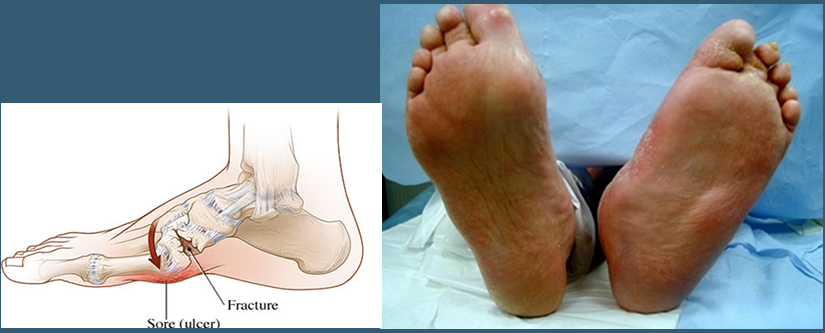Charcot's foot is a rare but serious complication that can affect persons with Peripheral Neuropathy, especially those with Diabetes Mellitus. Two of the most common complications of diabetes mellitus is nerve damage caused by peripheral neuropathy and poor circulation. Both can affect bone quality and cause damage to soft tissues and joints.
Charcot affects the bones, joints, and soft tissues of the foot or ankle and occurs when the bones of the foot and ankle weaken enough to fracture, and with continued walking, the foot eventually changes shape and deforms. Symptoms of Charcot are warmth to the touch (the affected foot feels warmer than the other), redness in the foot, and swelling in the area affected and pain or soreness in the earlier stages.
Diabetics with peripheral neuropathy are at greater risk for developing a Charcot deformity especially if their blood sugar and the diabetic condition is not well controlled.

Nerve damage from peripheral neuropathy often leads to changes in the sensation in the feet and the ability to feel temperature, pain, or trauma. Some people with diabetes can no longer feel when something has irritated or even punctured their skin. In the case of Charcot, ligaments, and bones become weakened causing them to break or fracture and the joints in the foot or ankle to dislocate. Thus, diabetics can literally walk on broken bones in their feet without feeling them. As a consequence, a diabetic with significant peripheral neuropathy may continuing to walk on fractured bones and unstable joints causing severe damage to the foot and ankle. As the Charcot condition progresses, the joints in the foot collapse, and the foot ultimately becomes deformed into an abnormal shape described as a "rocker bottom foot." Sharp edges of broken bone within the foot can point downward toward the ground, increasing the risk of chronic foot sores from the abnormal pressure. An open wound with foot deformity can lead to an infection and even amputation.
There are treatment options for a wide range of diabetic foot problems. The most effective treatment, however, is prevention. Sole Remedy provides diabetic footwear and inserts to protect feet from friction, calluses, and ulceration.
Sole Remedy is an accredited pedorthic facility and provider of ankle-foot orthoses,
foot orthotics and properly fitting footwear for patients.
We can help you manage your diabetic feet!
Sole Remedy specializes in gait analysis, foot type assessment, musculoskeletal injury management, and fall prevention.
Phone: 508-295-8800 or 855-FOOT RX 9 to schedule an appointment today!
